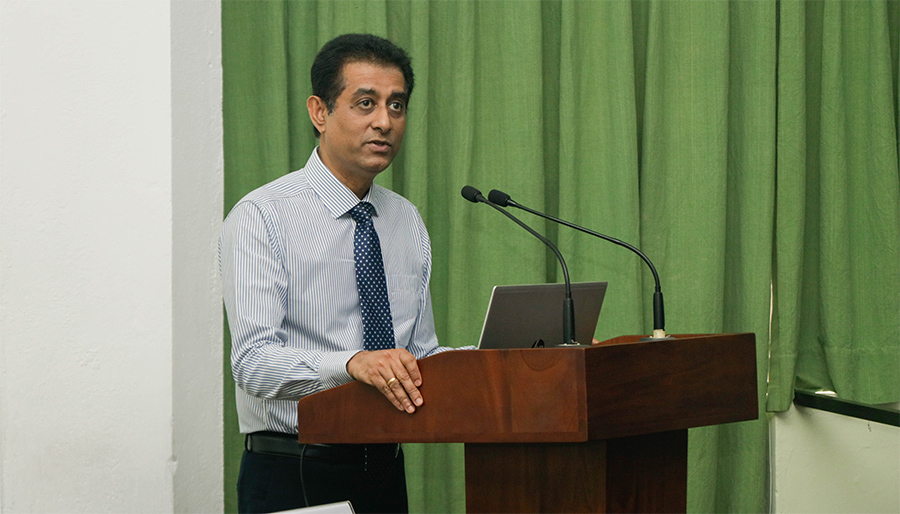
• The country can achieve significantly higher economic growth supported by international trade.
• Sri Lanka to deepen trade ties with South Asian countries (Bangladesh, Pakistan, China, India) and increase access in East Asia (Thailand, Malaysia, Singapore).
• Expand into fast-growing regional markets like ASEAN and RCEP members.
• Attract Foreign Direct Investment (FDI) into Sri Lanka and generate more jobs locally and globally through FTAs.
The negotiating team of the Sri Lanka-Thailand Free Trade Agreement (SLTFTA) and industry experts recently discussed the FTA and its impact on Sri Lanka’s economic growth, at a knowledge session organised by The Ceylon Chamber of Commerce.
Mr. Duminda Hulangamuwa, Chairman of the Ceylon Chamber, while stressing the importance of facing global market competitiveness, emphasised that Sri Lanka needs to explore and leverage agreements strategically to be competitive with countries like Vietnam, Thailand, Malaysia, China, and Singapore. He asserted that sustained international trade growth can lead to an 8 to 9 percent economic growth rate, and the nation cannot rely on 2 to 3 percent growth.
Chief Negotiator, Mr. K J Weerasinghe, on the other hand, underscored the need to align with the government’s vision for global market access and attracting investments. He outlined a three-pillar strategy focusing on protecting and promoting existing trade partnerships with the US and European Union, expanding market access in South Asia with countries like Bangladesh, Pakistan, China, and India, and increasing market access in East Asia with Thailand, Malaysia, and Singapore. He acknowledged, that Sri Lanka lost opportunities on the trade side in the last five years, and emphasised the need to act swiftly to capitalise on future opportunities.
Drawing similarities with Sri Lanka’s Free Trade Agreements with Thailand and Singapore, Ms. Renuka Weerakoon, DG, BOI and Head of Investment Chapter, highlighted the comprehensiveness of these FTAs, covering areas such as trade facilitation, services, proceedings, Sanitary and PhytoSanitary (SPS), Technical Barriers to Trade (TBT), investment, trade remedies and intellectual property. She emphasized that FTAs are crucial for Sri Lanka, given its small domestic market, and can lead to increased market access, Foreign Direct Investment (FDI), job opportunities, foreign exchange, innovation, technology transfer, and international trade networks. She also emphasised the expectation of increased Thai investments in manufacturing and services under the recently signed SLTFTA.
Mr. Deshal de Mel, Advisor, Ministry of Finance and Head of Trade in Services Chapter, emphasised that the SLTFTA is part of a broader strategy to drive qualitative changes in Sri Lanka’s economic growth. He highlighted the importance of FTAs in the economic recovery strategy and the need for Sri Lanka to integrate into global and regional value chains. He observed that the non-tradable sector has dominated Sri Lanka’s economic growth, and moving forward, the country needs to move into non-debt- creating avenues and diversifying its exports beyond traditional products. He noted that FTAs provide open access to regional trade value chains and create opportunities to participate in regional trade agreements to drive sustainable economic growth. He underscored that long-term economic growth is driven by productivity, which is ultimately determined by competitiveness in global markets.
Dr. Asanka Wijesinghe, Research Fellow, Institute of Policy Studies (IPS), highlighted research findings from the IPS which indicate that the Sri Lanka-Thailand FTA could increase Sri Lanka’s exports by 38% through tariff elimination. He emphasised the importance of Sri Lanka focusing on manufacturing, apparel, rubber products, and food products under FTAs, as these sectors have high tariffs in Thailand, offering significant export potential. He suggested that FTAs can be a strategic tool for Sri Lanka to engage in targeted liberalisation and pursue growth through specialized trade agreements with specific countries, such as the potential agreement with the EU for electronic vehicle manufacturing components.